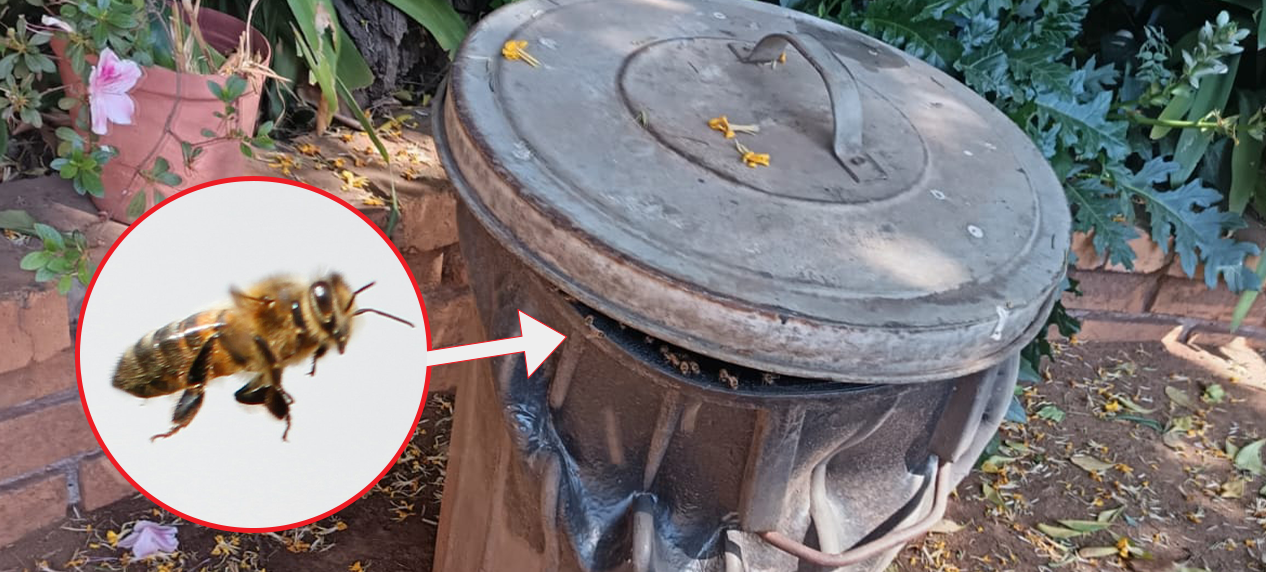The Buzz on Bees: Why These Pollinators Are Crucial to Our Ecosystem
By Amos Letsoalo – Wildlife and Infrastructure, Senior Field Officer, Endangered Wildlife Trust (EWT)
** Note: EWT Head Office staff have been working from home since the end of September due to construction work taking place at the Conservation Campus in Midrand, Gauteng.

Beehive settling inside garden compost bin
When I stepped out into my garden one morning in mid-October, I was surprised to see swarms of bees buzzing around, particularly near a dustbin I was using for composting. I watched as they clustered around it, and eventually some of them began to flit between the flowers. Initially, I thought they were just passing through, but as the day went on, they remained. The next morning, I checked again and found that they had settled in. Some bees were busy collecting nectar from the flowers, suggesting that they might have found a new home in my garden.
My new residents have settled in well in the half-empty composting bin, which I have moved from its original home to a quieter spot so they won’t be disturbed. Now they spend their days buzzing between my flowers, collecting nectar and pollen. It was their choice of my garden to live in that got me thinking about the importance of bees in our lives.
Why Bees Matter
Bees are amongst the most vital creatures in our ecosystem, playing a crucial role in pollinating plants and maintaining biodiversity. Without bees, many of our favourite foods and flowers would disappear. That is why it is essential to protect them.
Bees are pollination powerhouses responsible for pollinating around a third of the world’s crops, including fruits, vegetables, and nuts. Without bees, many of these crops would be unable to reproduce, leading to food shortages and economic losses.
Bees contribute to ecosystem health by pollinating flowers and plants, which in turn support a wide range of wildlife. By pollinating plants, bees help maintain ecosystem health and biodiversity.
Bees are economically important because of their contributions to the global economy, not only through pollination services, but also the production of honey, which is used in a variety of products.
Why Bees Are in Danger
- Habitat Loss: Bees rely on flowers and plants for food and shelter. However, habitat destruction and urbanisation have reduced the availability of these resources.
- Pesticides and Chemicals: The use of pesticides and chemicals in agriculture can harm bees and other pollinators.
- Climate Change: Climate change is altering the timing of plant-bee interactions, making it harder for bees to find the resources they need.
How We Can Help
There are a number of ways in which we can ensure the survival of bees. One of these is to create bee-friendly habitats by planting flowers and other plants in our gardens to provide a source of food and shelter for bees. Another is to avoid the use of pesticides and other chemicals in your garden. Rather, opt for organic or integrated pest management methods. Supporting local beekeepers through the direct purchase of honey and other bee products supports an industry that is critical to people and the environment.
My Personal Commitment
Since the swarm of bees moved into my garden, I’ve made a personal commitment to protect and support these incredible creatures. By providing a safe and welcoming environment, I hope to contribute to the well-being of these vital pollinators, as my garden has a number of flowering plants.
Bees are a crucial part of our ecosystem, and it’s essential that we take steps to protect them. By understanding the importance of bees and taking action to support them, we can help ensure the long-term health of our planet. So, let’s all do our part to protect these incredible pollinators!
